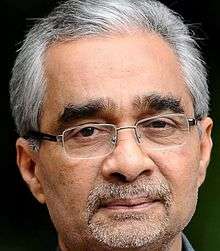Bolwar Mahammad Kunhi
| Bolwar Mahammad Kunhi | |
|---|---|
 Bolwar Mahammad Kunhi | |
| Born |
22 October 1951 Puttur, Puttur taluk, Dakshina Kannada, Karnataka |
| Pen name | Bolwar |
| Occupation | Retired Chief manager, Syndicate Bank (December 1972 to October 2011), writer, playwright |
| Nationality | India |
| Genre | Short stories, Novels, Plays, Biographies |
| Literary movement | Activist working against radicalization of youth towards religious extremism |
Bolwar Mahammad Kunhi (born 1951) is a short story writer, novelist, playwright and scriptwriter, who writes in the Kannada language.[1] He is known for introducing Muslim culture into Kannada prose.
Kunhi authored short story collections, novels, stage plays and children's books, besides several other editorial works. He won three Sahitya Akademi Awards from Karnataka Sahitya Academy, including a lifetime achievement award (1997). He won National Awards for his contribution to Kannada Films. His works have been translated into other Indian languages. His works, focus on erasing illusions about Islam in India and nurturing a more positive outlook towards Islam.
A post-graduate with a gold medal in Kannada literature from Mysore University, Kunhi is now retired from being a chief manager for Syndicate Bank's Bangalore Corporate Office.[1]
Works
This writer edited what is considered the finest work ever produced in Kannada for children – "Tattu Chappale Putta Magu", a collection of over 100 poems and "Santammanna", an anthology of 40-odd illustrated poems.[2]
He is the recipient of the Kendra Sahitya Akademi award for the story of an ordinary Mohandas who became Mahatma Gandhi in his "Paapu Gandhi" Bapu Gandhi Aada Kathe. Apart from Gorur Ramaswamy Iyengar, only Bolwar has written about Gandhi for children. The Mahatma had kept the child Monu alive in himself until he died a martyr. The book spoke of Mehtab, Gandhi's Muslim friend who was a great source of courage to him. It was translated and published in English with the title Gandhi – From Monu To Mahatma.[3] During the book launch Jnanapith awardee, U.R. Ananthamurthy said in praise of Kunhi's book "This is one of the best books on Mahatma Gandhi for children and adults". Ananthamurthy also said Kunhi is blessed with great insight, and that his works are finely tuned, transcending time. "Kunhi's collection of songs and poems are among the best in contemporary Kannada literature,".[4] The book was also enacted as children's play.[5]
His extended short story, "Ondu Thundu Godae," or "A Bit of Wall" treats the explosive Ayodhya theme in a humorous, personal vein. He recounts the story of an old woman, Roti-Phatumma, who wanted to build her own house by acquiring what she believed to be a bit of the wall from the broken pieces of the Babri Masjid. Tongue-in-cheek Kunhi balances serious, comic and poignant aspects.[6]
His epic 1,110-page opus named "Swathranthada Ota" (in English: The run for independence) released on 18 March 2012 at Ravindra Kalakshetra, Bangalore. His latest book `Odiri' considered as the first-ever historical novel on Prophet Muhammad.
Awards and recognition
In addition to Karnataka Rajyotsva Award (2012) he received 3 Sahitya Akademi Awards from Karnataka Sahitya Academy, including its lifetime achievement award (Fellow of Karnataka Sahitya Academy-1997). In 2010 he celebrated many Central Sahitya Academy awards for his book on Gandhi. Kunhi is awarded with Central Sahitya Academy for second time in December 2016 for his Kannada novel Swathantryada Ota (Run of Independence). Kunhi is the only writer to have got the Central Sahitya Academy award twice.[7]
He received several other literary awards including, Bharathiya Sahitya Samsthana Award, Kolkatta (1981), Katha-Delhi (1993), Aryabhata (1984), Parashurama (2001) Shivarama Karantha Balavna Award, Basavaraja Kattimani Award (2013), Toulava Award(2010), Suryanarayana Chadaga Award(2012) Abhudabhi BWF Awar (2015) besides winning National and State Awards (2002 and 2003) for his contribution to Kannada Films.
Varthabharathi daily newspapers, Sunday supplement – Suggi dedicated an article on Kunhi and prominent Kannada writer Yashwant Vithoba Chittal. It concentrated on their plans for future books. It was published on 15 August 2011, India's independence day.[8]
References
- 1 2 "Kunhi, Bolwar Mohammed – author page". Countrybookshop.co.uk. Retrieved 27 January 2012.
- ↑ Deepa Ganesh (26 August 2010). "Arts / Books : The Monu magic". The Hindu. Retrieved 27 January 2012.
- ↑ Bansal, Rashmi. "Gandhi – From Monu To Mahatma: Book: Bolwar Mahamad Kunhi (9781907219511)". Flipkart.com. Retrieved 27 January 2012.
- ↑ "FEATURES / METRO PLUS : In the beginning". The Hindu. 10 March 2011. Retrieved 27 January 2012.
- ↑ "Tiny steps to Gandhigiri – Times of India". Articles.timesofindia.indiatimes.com. 13 April 2011. Retrieved 27 January 2012.
- ↑ "History as Metafiction: Shashi Deshpande’s Small Remedie" (PDF). Retrieved 27 January 2012.
- ↑ "Central Sahitya Akademi award for 2 Dakshina Kannada writers". The New Indian Express. Retrieved 2016-12-25.
- ↑ "VarthaBharathi e-paper". Vbepaper.com. Retrieved 27 January 2012.